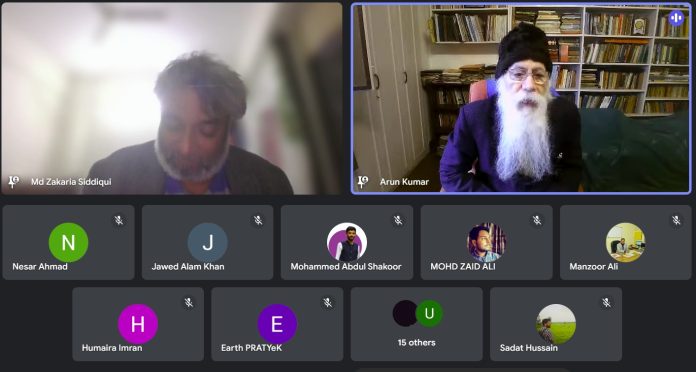In a keynote address on “Economic Growth: Social Sector Spending and Inclusion,” delivered during an online programme organised by the Institute of Policy Studies and Advocacy (IPSA), Prof. Arun Kumar, Malcolm Adiseshiah Chair Professor at the Institute of Social Sciences, explored critical economic challenges and proposed actionable solutions ahead of the upcoming budget.
Prof. Kumar began by emphasising the need to understand the budget process by first evaluating available resources and determining how to mobilise them effectively. He underscored the budget’s role as a critical tool for economic planning and highlighted its importance in addressing pressing national issues.
Prof. Kumar questioned the current GDP calculations, noting a disconnect between reported figures and the ground realities of the informal sector, which constitutes nearly 94% of the economy. He argued that GDP growth, often reported at over 5% post-demonetisation, might actually be closer to 1-2%, given the limited inclusion of informal sector contributions.
He stressed the importance of achieving full employment to reduce societal inequalities and called for reforms in the GST framework, which he observed disproportionately benefits the formal sector. The informal sector, comprising agriculture and small businesses, often lacks access to GST input credits, leaving it disadvantaged.
Prof. Kumar advocated for increased investments in education, health, and skill development. He proposed reforms in corporate tax, simplification of income tax, and mechanisms to extract taxes from at least 40% of the informal sector. These steps, he argued, could generate significant resources for social sector funding. He also suggested introducing wealth, inheritance, and gift taxes to address wealth inequality, noting that 90% of the nation’s wealth is concentrated in the hands of a few.
He addressed concerns about capital flight due to taxation, citing Malaysia’s success in implementing capital controls to prevent such issues while maintaining economic growth.
Prof. Kumar concluded by emphasising the need for political will to implement these measures. He highlighted the role of social movements in driving policy changes, pointing to examples from the early 1990s when mobilisation of workers, women, and underprivileged communities led to significant reforms.
Kanika Kaul, speaking on Gender Responsive Budgeting (GRB), identified five critical areas for attention: Limited focus on GRB in budget statements; Declining social sector spending, including reduced allocations for the Ministry of Women and Child Development; Insufficient social protections for women, such as decreased allocations for MGNREGA, inadequate maternity benefits, and minimal support for pensions; Underutilisation of the Nirbhaya Fund and insufficient budget for gender-based violence schemes; and A lack of reliable data for gender-based planning and budgeting.
Dr. Khalid Khan highlighted disparities in access to higher education, advocating for increased government institutions, financial aid for underprivileged students, and support for SC/ST and Muslim communities pursuing professional courses.
Dr. Sadat Hussain criticised the inadequate allocation for education, noting that only 3% of GDP is spent on education, far below the 6% recommended by the Kothari Commission and New Education Policy.
Dr. Jawed Alam Khan raised concerns about public health expenditure, pointing out that out-of-pocket expenses constitute 50% of health costs, with only 1.3% of GDP allocated to health compared to the recommended 3%. He also highlighted inadequate budgetary priorities for marginalised communities, including SCs, STs, minorities, and persons with disabilities, which hinder their access to essential schemes.




